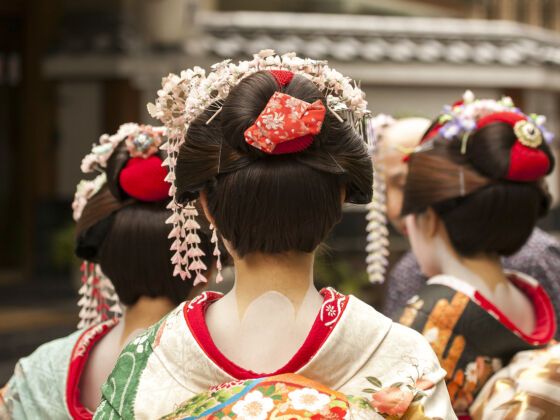Donald Trump recently visited Japan. In addition to beginning his trip eating hamburgers, playing golf, and not engaging in anything remotely Japanese, many around the world were confused by his comment that he could not understand why a country of samurai warriors did not shoot down any missiles from North Korea, referring to the two recent missiles that were launched over Korea’s eastern neighbor and impacted in the Pacific Ocean.


With Japan never far from the international spotlight due to these tests and more, it’s astonishing that anyone in this day and age with access to the Internet or a basic grasp of history would actually believe there are samurai wandering the streets of Tokyo, slicing missiles in half with their katana.
Let’s assume the worst: that most people are ignorant as far as Japan is concerned. Believing certain myths about the country is not only borderline (or, well, over-the-line) racist, but cultivates feelings of “us” and “them.” Doing so causes damage to international relations and basic decency — as we just saw with Trump, these backward perceptions of Japan can have real, dangerous consequences when they affect the relationship with a nuclear power. Some myths about Japan just need to disappear for the greater good.
1. Godzilla is everything.
Godzilla was a popular Japanese horror movie back in the 50s that spawned sequels, its own cultural revolution, a Hollywood star, and perhaps most recently a cultural ambassador to Shinjuku. For Americans, it’s also the image you latch onto because you know nothing else about Japan. Thinking of Godzilla as the only significant contribution Japan has made to the world completely negates some of the truly amazing things to come out of the country: anime, video games, ceramics, calligraphy, karaoke… not to mention the food.
2. Samurai still exist
Samurai as a class in Japanese society haven’t existed for 150 years. However, there are still plenty of Japanese people who will reference bushido (loosely translated, the code of ethics for samurai) as the reason behind certain behavior in modern society. There is certainly influence from samurai in Japan, just as there is the influence of chivalry in European countries, and Americans in the south who feel they need to honor the memory of their Civil War ancestors. The problem is assuming no progress has been made between then and now, reducing people to cultural archetypes rather than societies that have advanced and changed as certain practices became impractical.
3. Suicide is the only solution.
Japan does have a problem with suicide. So do the 10-20 countries with comparable or significantly higher suicide rates around the world. The way the media portrays things, outsiders might simply think that when the going gets tough, Japanese people kill themselves rather than dealing with their problems.
Is it any wonder why such stereotypes could exacerbate the situation? Perception, for better or worse, can shape reality — Japanese people may not be significantly influenced by this mythos in foreign media when they know their own culture and history better, but representing suicide as something natural about Japan, even comically absurd, reduces the weight of the act.
4. Japanese women are innately subservient.
To a greater extent, there’s still this stereotype of Japanese people as an entire nation of small weaklings… how ignoramuses reconcile that with them also being all samurai, we’ll just have to wonder. Nevertheless, it’s not an exaggeration to say that Japan’s kawaii (cute) culture is at the forefront of its image abroad — Hello Kitty, cosplay, mascots, kimono — and at its center are women.
Women are extremely underrepresented as elected officials in Japan, but this isn’t from some outdated notion of believing men are superior… try shouting that anywhere in the country sometime and see how long it takes a woman to punch you in the face. Great social progress has been made in the last 70 years, but holding all Japanese women in such low regard is damaging to women, damaging to Japan, and damaging to progress.
5. Japan still deserves to suffer, still owes the world.
We can argue about the morality of the actions taken during WWII until the end of time, but there’s no denying many of them keep coming back to bite the US while debating the use of nuclear weapons and having immigrants on a registry.
So deep runs the hatred that the grandchildren of veterans (and some who seemingly chose an enemy at random) still act as though the Japanese must continue to atone for the past. With China and Korea, these matters — war crimes, comfort women — are far from closed. As far as the US is concerned, however, acting as though the use of nuclear weapons on a country that is now a strong ally was justified gives credence to the idea that we can continue to drop these bombs and not face serious consequences. Nothing could be further from the truth.